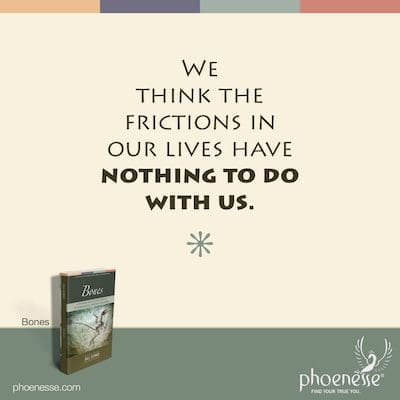When we set off on the road of our chosen spiritual path, we often have a sincere desire to unite with God. But before we can do that, we have to sort out how to unite with our fellow human beings. And we have lots and lots of chances to do so. This means we will have to learn some humility. And we must figure out how to love without our pride and ego getting in the way. We will also have to prove that we mean it when we say we want to know God—to know love. Because right here, right now, we can find God right where we’re standing. But only if we can learn how to love.
Our decision to walk a spiritual path of self-development creates a special blessing for each one of us. Whether we can feel this blessing or not, it’s real. These aren’t just nice words. But let’s face it, we’re going to need all the help we can get. Because the moment we say a prayer asking for help and strength, all hell is going to break loose. That’s when we know our prayers are being answered.
Our spiritual work, which comes in answer to our prayers, arrives in the form of a conflict or a friction. Something happens that makes us feel we are being treated unjustly. So then we will have a chance to recognize our inner errors and purify our souls. For how could we ever see our inner conflicts if don’t see them out-pictured right in front of our eyes? That’s the only way for us to see what lies hidden in us, deviating from divine law.
Since all deviations are by definition negative, they must show up as disharmony. This is simple logic, folks, but we often overlook it. We think the frictions in our lives have nothing to do with us. We’ve got to turn into the wind and look within, not becoming hurt and defiant, regardless of how wrong the other may be. Always ask: What’s the grain of truth for me to look at in this painful conflict?
Any prayer to know the truth will always be answered. If we knock, the door will open. And the newly arriving recognitions will cancel out the disharmony, our feelings of injustice, and our misery and defiance. Frictions with our brothers and sisters will then melt like snow in the sun; we will unite with understanding and with love. There is no other reason for life on Earth than to do this, and it’s never too late to begin.
So our goal is to sort our way through our inner wrong conclusions. For they have led to so much trouble in our lives. To do this, it will be helpful if we better understand what makes us and others tick. To this end, let’s look at the three basic types of human personalities.
The first of the three personality types runs their life mainly using reason. The second type governs mostly with their emotions. And the third does so using their will. So the three personality types are each dominated by either reason or emotion or will. But keep in mind, no one is ever totally one-sided; we’re all mutts with one type more predominant than the others. Sometimes this is obvious, and sometimes it’s more complicated. And sometimes we switch them up a bit depending on the situation. This makes our modus operandi even more difficult to detect.
Ideally, in the well-balanced personality, each of the three aspects will find their rightful place. But since there are no perfect people, the three trends typically find themselves misdirected into the wrong channels. For example, we lean on our emotions when reason should prevail, or the other way around. We will want to get a bead on which type we are, as this will help us in excavating our layers of inner error.
REASON TYPE
If we are the Reason Type, we govern our lives primarily using the reasoning process, making us prone to neglecting our emotions. Frankly, we’re afraid of our feelings so we thwart them. In doing so, though, we cripple one of our most important faculties: intuition. We don’t trust our intuition because our fear blurs it out, and it’s intangible. In general, we don’t trust things that aren’t tangible.
Secretly, we tend to look down our noses at Emotion Types. We are so danged proud of the way we steep ourselves in the process of reasoning. We press our will into the service of following deductions made with our brains, ignoring intuition or emotions, which, in truth, we should also be heeding.
People who are Reason Types are often smart, perhaps working as scientists. We are also often agnostics or even atheists, and we tend to be materialistic. But that doesn’t make us less aware or less spiritually developed. There are many enlightened and awake Reason Types, just as there are of the other types. The difference we’re talking about is approach, not level of development.
The Reason Type may have difficulty experiencing the divine within and having good intuitive judgment about people. Our will, which everyone needs, is used by the Reason Type in a premeditated way—and often overly cautiously. Our goal is to find the healthy middle way in which we use our will both rationally and emotionally, depending on what a situation calls for.
The Reason Type tends to miss out on a lot of life experiences due to fear and pride, because we basically fear any emotions that might lead to an experience we don’t think we’ll be able to handle. The deal is, having a life where emotions are involved will require us to ride through some uncertainty and risk. And we, the Reason Type, like to keep everything in shipshape order, always “knowing” where we stand. But avoiding emotions leaves us adrift from our core.
EMOTION TYPE
The Emotion Type is equally one-sided. We pride ourselves in being capable of truly feeling, so while we may find it easier to connect with inner divinity, we easily become carried away by our emotions. As Emotion Types, we secretly look down on Reason Types, perhaps derogatorily labeling them “intellectuals” and losing sight of the fact that reason is as God-given as emotions. But we’re not any less arrogant or in any more harmony than an off-balance Reason Type.
True, the Emotion Type will tend to have better intuition, and are sometimes not so afraid of feelings, but we tend to lose our grip on the reins of life, compared to the Reason Type who tends to hold the reins too tight. Being overly emotional, an Emotion Type can lose control and become blind to what’s really most important for our lives and for our personal development.
We can easily lose sight of weighing and selecting good options, and having a sound discriminating mind. In this case, we must learn to use our intellect to curb our wild emotions that often flow erratically. Then we will begin to use our willpower properly, instead of unconsciously.
If we’re an extreme Emotion Type, we will impact our surroundings with our uncontrolled emotions. In the beginning, we might be able to control the temptation to give in to our wayward feelings, but the more we give in, the more runaway they become. Eventually, we get carried away by the torrent that destroys everything in its wake. In this state, we are selfish and destructive, but it is different from the way selfishness manifests for the Reason Type.
What Emotion Types must come to see is that what we’re so proud of is no longer serving as an asset. We have to learn to cool it by cultivating some deliberate thinking and planning. This selecting process is what opens the door to wisdom.
None of us can exist without the use of our will, and the Emotion Type uses will in a chaotic and impulsive way, without careful consideration. Submerged by unchanneled instincts rather than buoyed by constructive intuition, we lose our balance, continually convinced that our way—which is also a wrong way—is the right way.
Whereas the Reason Type fears losing control and thereby cuts off life’s beauty and happiness, the Emotion Type fears curbing their nature, thinking discipline will mean giving up something valuable. Both ways are in error, for only the harmonious middle path will get us to a complete solution.
WILL TYPE
The Will Type is altogether different from the previous two types. Our will should always be the servant and never the master. So ideally, our will should equally serve our emotional, intuitive faculties and our reasoning processes. But the Will Type makes a master out of the servant, which pulls us out of focus in a dangerous way.
As a Will Type, we will look down upon the other types with disdain. We’ll see Reason Types as intellectual snobs who might talk a good game and have wonderful theories, but they’re all talk. Nothing gets done. We are the achievers who make it happen. The Emotion Types, we think, accomplish even less. That makes them even more despicable.
While this assessment might in fact be right, we’re wrong in thinking that our extreme is better than the other extremes. Extreme is extreme, and it’s never in the middle of the road, which is where we want to be.
The Will Type sets out for achievement and wants tangible results. Such focus makes us impatient and that may cost us the very result we’re seeking. It binds up the reasoning process which, when combined with intuitive processes, brings us to wisdom. And without this wisdom, there’s no way we can accomplish our goals. Or if we succeed, we can’t benefit from it in the right way, so we lose it again.
If we’re a Will Type, we will tend to throw caution to the wind, losing sight of the many essential considerations needed to discover the truth in any situation. We’ll neglect our emotional side, fearing our feelings about as much as the Reason Type does. But here, our purpose—although it’s often unconscious—is to remain the master, and our emotions might hinder our aim. So we too will miss out on a lot in life because we’ll never give ourselves over to a feeling without knowing what the outcome will be and the possible advantage to us of taking the risk.
For most of us, we’ll see how two of three faculties dominate and a third is crippled. And while sometimes our type is clear-cut, many of us are a jumble of being over-emotional in some ways and over-intellectual in others. Or we might mask over our true nature, wherein a person who is basically emotional may don a foreign mask of intellectuality. So outwardly we could appear calm and controlled, but inwardly there’s a storm of emotions brewing.
It’s not unlike the way active and passive currents interact in the human soul. Although there may be a predominance of one of these traits, a healthy person needs to have both. But what often happens is that we’re active where we should be passive and vice versa. Similarly, we often react with emotions when a more reasoned approach would be better, or we apply our will where we should be allowing instead.
In their essence, each of these types carries a divine quality. In their highest state of perfection, the Reason Type is the Angel of Wisdom, the Emotion Type is the Angel of Love and the Will Type is the Angel of Courage. These are all aspects of divinity that each of us can develop, and which can all work together in harmony.
There is no competition for which is better. They are equal and in their ideal form, they are in balance. But that doesn’t mean they are distributed in equal measure. In our current incarnation, we have the opportunity to purify ourselves, whichever type we are, and move in the direction of perfection.
So our aim as we go deeper and deeper into ourselves is to see how these currents are functioning, with one interfering rather than helping the other along. In this way, we can move in the direction of operating as one harmonious whole, within ourselves and with all that is.
Return to Bones Contents
Read Original Pathwork® Lecture: #43 Three Basic Personality Types: Reason, Will, Emotion




